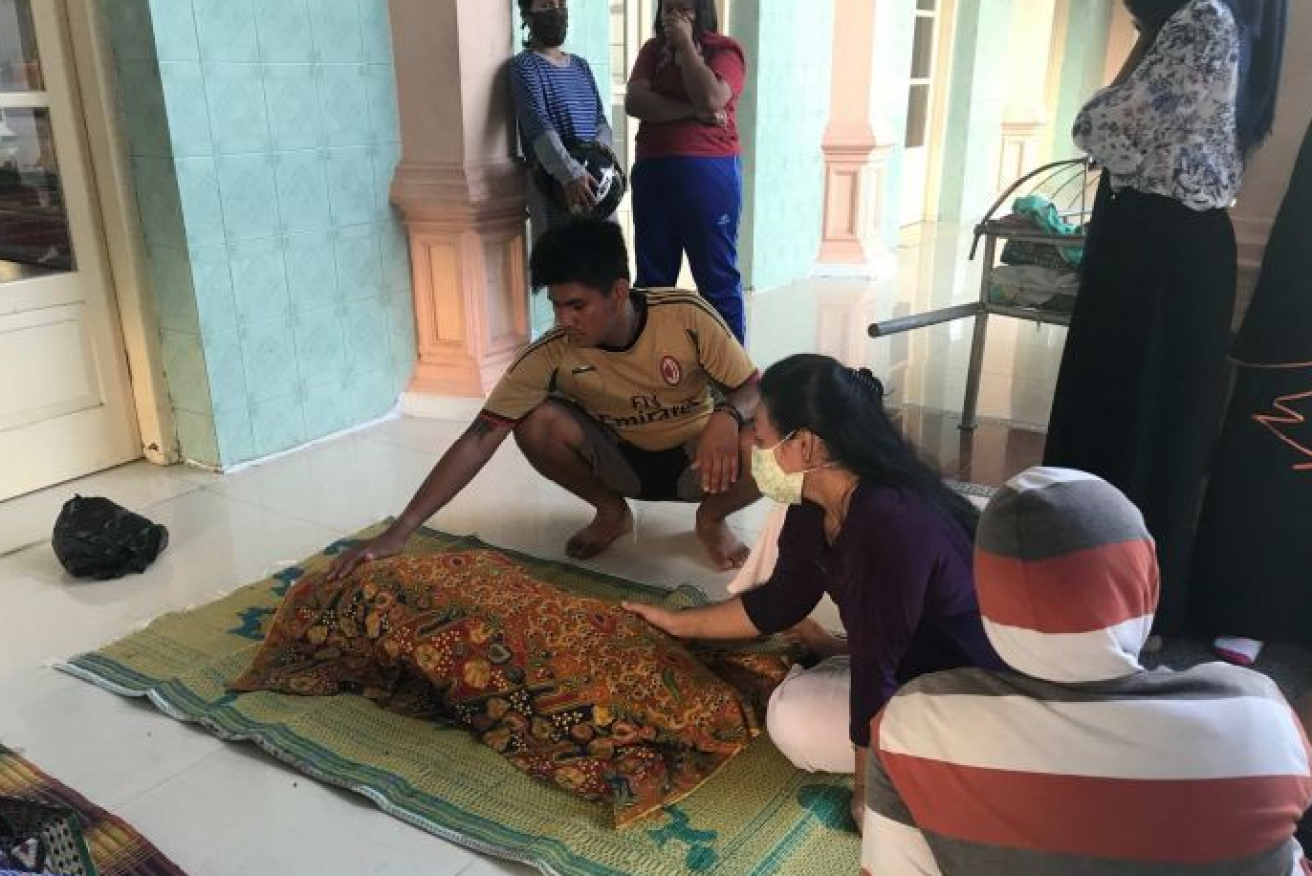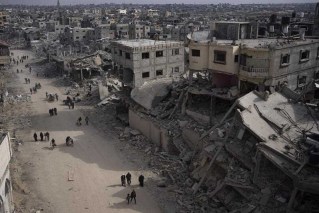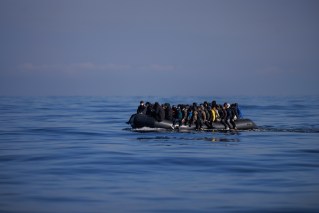A family meal, the ground shook … and three children were gone forever

Andi Rainaldi finds the body of his son at a local mosque, which has been turned into a temporary morgue. Photo: (ABC News: ABC/Phil Hemingway
On Friday afternoon, Andi Rainaldi and his wife, Flarahanie, sat down to a meal of fried banana with extended family at Boya, a tiny waterside village near Donggala in Indonesia’s Central Sulawesi.
As the adults talked, the children played, including the couple’s son Endi Rafi Alfariel and their two nieces Sakinah, 6, and Husna, 9.
That was until the magnitude-7.5 earthquake struck around 6:00pm.
Donggala was the area closest to the quake’s epicentre, about 30 kilometres north. And the village of Boya was one of the worst-hit areas.
As the house began shaking, not all residents had time to run outside before their homes collapsed and toppled into the sea.
The three young children didn’t stand a chance.
Less than half an hour later a powerful tsunami swept in, hitting Boya and the surrounding coastline and washing more buildings into the water. Mr Rainaldi told the ABC the entire village had disappeared. Not a single house was left standing.
In all, seven members of Andi Rainaldi’s family disappeared, including his son, two nieces, his godson and his aunt. All were either trapped and killed under the rubble when the house collapsed, or washed out to sea when the huge waves pounded the shore.
Mr Rainaldi and his wife spent days searching for their son and relatives. But by yesterday — when the ABC arrived in Donggala — they already expected the worst. Several bodies were seen floating in the sea offshore.
A few hours later the couple found their son’s body at the local mosque, which has been turned into a temporary morgue.
“I couldn’t even identify my son by his face, only by his clothes,” Mr Rainaldi said.
“We found him physically unrecognisable.
“I’m so sad, devastated. He was my only son, my only child. And he’s just a little boy. I miss him so much. It’s very hard to lose him. We’ll bury them all as soon as possible.”

Luckier than many, Siswanto stands near the spot where his swept-away son – and this fishing boat – came to rest, shaken but alive. Photo: ABC/Ari Wu
At least 20 people are reported to have died in Donggala, and similar numbers were still missing yesterday.
Bereft family members visited the mosque throughout the day searching for loved ones. More than a dozen bodies were laid out, wrapped in sheets.
Eerily, several still had their arms outstretched, or their hands splayed wide, an indication perhaps of their last moments struggling against falling rubble or giant waves.
‘I don’t know where to go’
Along the coast at Donggala, houses lay in crumpled ruins. Iron roofs, furniture and personal effects littered the streets. Among them, a pile of old photographs and postcards from happier times.
One house was pushed off its foundations when the tsunami rammed a large fishing boat into the shore. Debris from the house was strewn all around, while the fishing vessel — still intact — sat on the site.
The home’s owner, Siswanto, said his son, wife and grandchild were all inside when the earthquake stuck. They managed to run outside in time.
But the tsunami swept his son hundreds of metres down the street before he could reach higher ground. Amazingly the entire family survived.
On Sunday workers were frantically trying to remove the boat from its new dock, and demolish what was left of the home.
“I don’t know where we’re going to go,” Siswanto told the ABC.
“At the moment we’re going to a refugee camp, and maybe later to stay with relatives at Palu.”
Thousands of people are now sleeping in tents and under tarpaulins along the road, on sports fields or on clear ground.
The damage and death toll is far higher at Palu, normally an hour’s drive south of Donggala.

On any other today it would be a house of prayer. Today this Boya mosque is a makeshift morgue.
The tsunami hit a vast length of coastline between the two cities, submerging houses, hotels and other buildings. Hundreds of aftershocks in the days since have added to the damage and set off a series of landslides.
Much of Palu was in pitch darkness for a third night last night, with power still out and communications infrastructure badly damaged.
Even residents whose homes survived the quake are choosing to sleep outside, in fear there’s more to come. Hotels were open, but wouldn’t allow anyone to sleep inside, as a precaution.
More than 830 people are confirmed dead, but authorities expect the death tool to rise far higher. Most are believed to have died in collapsed buildings after the main earthquake on Friday.
Throughout Palu, many streets have the stench of rotting corpses, either from bodies yet to be recovered or those taken away.








